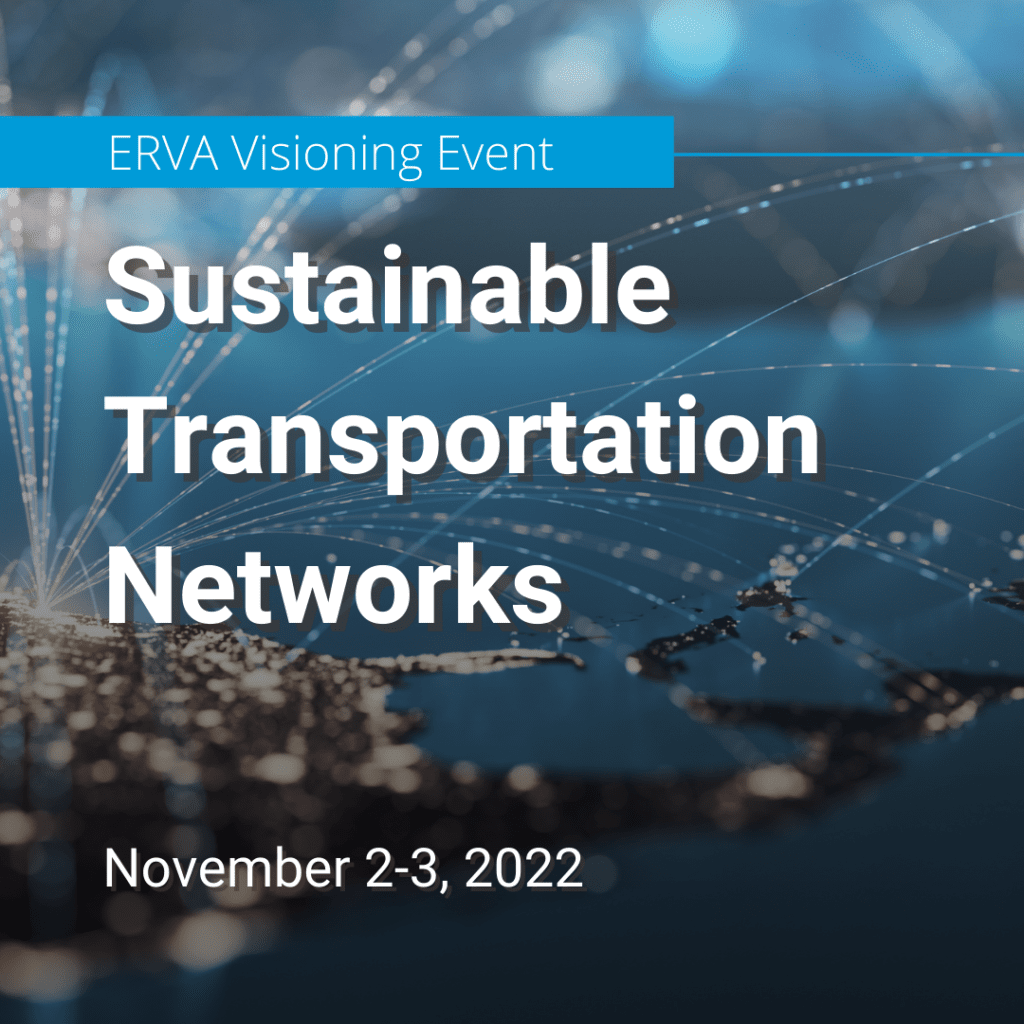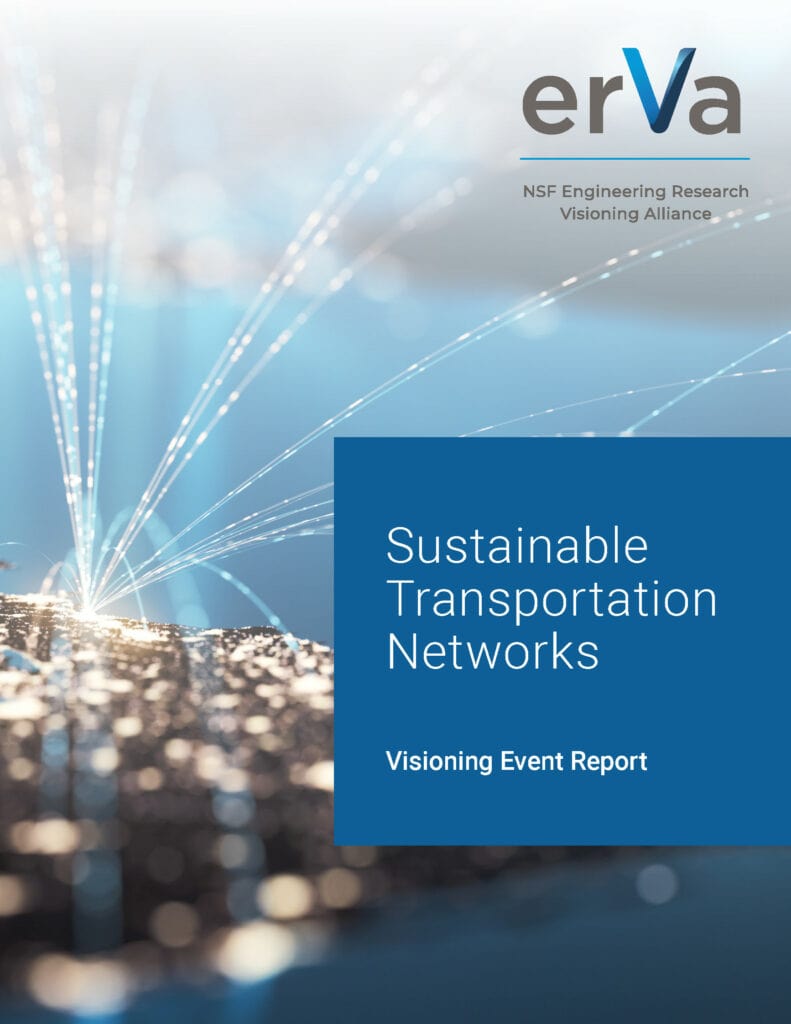The Engineering Research Visioning Alliance hosted a webinar May 24, 2023, to discuss the findings of ERVA's report, Sustainable Transportation Networks. The event featured Cathy Choi, chief sustainability officer and VP of engineering at ClearFlame; and Erin Bell, professor and chair, Department of Civil and Environmental Engineering at the University of New Hampshire, who co-chaired the ERVA visioning event that culminated in the report. The engineering research priorities discussed during the webinar were identified within four themes: infrastructure, vehicles and transportation modes, data, and our people and community. These are ripe directions for engineering research to lead and to enable sustainable transportation networks.
Engineering Research Visioning Alliance’s (ERVA’s) latest report outlines how engineering research can help shape the future of sustainable transportation
April 27, 2023 –Whether moving people or freight, transportation is the largest user of energy in developed countries and the most rapidly growing energy consumer in developing nations. Achieving a future where transportation works efficiently and sustainably is the focus of a new report from the Engineering Research Visioning Alliance (ERVA), an initiative funded by the U.S. National Science Foundation. It articulates bold engineering research priorities to advance a future with fully sustainable transportation networks. It also aims to inspire researchers and funders (public, private, and nonprofit) to support and pursue these research priorities. The executive summary and full report can be found on ERVA’s website.
As the world faces increasing energy and climate challenges, engineering research is well positioned to address the science and technology needs for transportation modes, infrastructure and networks – both physical and digital—in a way that is sustainable, fair and equitable to all communities.
“One of the greatest challenges in creating a sustainable future is how we move people and goods,” said Erin Santini Bell, professor and chair of the University of New Hampshire’s Department of Civil and Environmental Engineering and co-chair of the ERVA Thematic Task Force that framed the visioning event. “This report offers a framework for the entire engineering research community to invest their resources and talent to address the problems surrounding transportation networks and their broader impact on society.”
The report illuminates three approaches for future transportation research: leveraging data-informed operations to improve transportation systems; advancing sustainable technologies that incorporate versatile materials; and the overarching need to improve equity and accessibility through transportation device and service design.
Although electric vehicles are often the centerpiece of today’s sustainable transportation discussions, developments in electrified transportation represent just one aspect of the overall challenge. ERVA convened a diverse array of experts, practitioners, and academics to identify engineering research priorities in four key areas: infrastructure, vehicles and transportation modes, data, and the community.
“Transportation networks of the future will be safe, efficient, resilient, and sustainable, with more cooperative traffic patterns facilitated in part by GPS-increased accuracy,” said Cathy Choi, chief sustainability officer and vice president of engineering at ClearFlame and a co-chair of the ERVA Thematic Task Force. “However, to address gaps and barriers, we must build trust in critical ways—not simply by having these systems be safe and efficient, but by considering the real-world usage and affordability needs of all users.”
Sustainable Transportation Networks is the fourth report released by ERVA, an initiative funded by the NSF to help identify future engineering research directions. To read the report, visit ERVA’s website. View the previous ERVA reports, Engineering R&D Solutions for Unhackable Infrastructure, Leveraging Biology to Power Engineering Impact, and The Role of Engineering to Address Climate Change.
ERVA is funded by an the National Science Foundation.
About The Engineering Research Vision Alliance (ERVA):
The Engineering Research Visioning Alliance (ERVA) is a neutral convener that helps define future engineering research directions. Funded by the NSF Directorate for Engineering, ERVA is a diverse, inclusive and engaged partnership that enables an array of voices to impact national research priorities. The five-year initiative convenes, catalyzes and enables the engineering community to identify nascent opportunities and priorities for engineering-led innovative, high-impact, cross-domain research that addresses national, global and societal needs. Learn more at www.ERVAcommunity.org.
The event brought together more than 80 researchers and technology experts to ideate over two days
Nov. 3, 2022 — Beyond today’s planes, trains, ships, and automobiles, the future of transportation requires new infrastructure, networks, and modes to get from point A to point B. This week, researchers from academia, industry, and government sectors convened to identify priorities for engineering research to address sustainable transportation networks at a virtual visioning event coordinated by the Engineering Research Visioning Alliance (ERVA), a U.S. National Science Foundation-funded initiative.

The ERVA visioning session was structured to spur creative, bold thinking and gather future-focused research ideas from innovators and researchers in a range of transportation specialty disciplines. A thematic task force co-chaired Erin Santini Bell, University of New Hampshire, and Cathy Choi, ClearFlame, who also serve on ERVA’s Standing Council, structured the proceedings over two days to identify specific areas that are at the edge of the thought horizon or are underexplored and require additional research and have the potential for the greatest return on investment.
“The ERVA platform is a springboard for interdisciplinary thinking, custom-designed to bring together the minds and expertise to address a complex challenge like transportation,” Bell said. “The ideas this group synthesized will plant the seeds for the engineering community to develop innovative approaches for a smart, community-centered, resilient, and sustainable future.”
ERVA visioning events provide a unique opportunity for selected participants to advance the goal of catalyzing the pursuit of innovative, high-impact research that benefits society and the planet. The participants considered new transportation vehicles, networks and modes that emphasize efficient energy usage, produce low or no emissions, utilize alternative materials and novel construction and manufacturing processes, enhance the efficiency of freight and logistics, and leverage appropriate levels of automation and connectivity. Safety, affordability, and diversity, equity, inclusion, and accessibility in mobility are characteristics considered essential to drive the positive impacts on social and economic conditions that will benefit society.
“This was a tremendous opportunity to integrate innovative and diverse engineering research perspectives to address one of society’s grand challenges," Choi said. “Bold thinking lays the foundation for us to stay at the forefront of engineering and technology by identifying tomorrow’s ideas, fostering transformational engineering research, and laying the groundwork for our next generation of great engineers.”
Event participants were identified and invited based on their research and expertise and represent scientists across academic disciplines, geographic location, organization sector and type, gender, race/ethnicity, and career stage. Specific themes explored include infrastructure, vehicles and transportation modes, engineering research in data to support future transportation networks, and systematic engineering practices to improve transportation needs for all communities.
ERVA was established to provide the engineering community with a process for identifying bold and societally impactful engineering research directions that will place the U.S. in a leading position to realize a better future for all. It is an engaged, inclusive, multilayered partnership, providing a truly diverse array of voices with the opportunity to impact national research priorities.
The results of the proceedings will be distilled and disseminated via a thematic report that will help set priorities for the future of engineering. The report will include high-value findings that will identify less-explored, basic and use-inspired lines of research ripe for the engineering community to pursue to enable a future with optimized transportation via land, sea, air, and the next generation of travel modalities.
Learn more about this visioning event and the work of the thematic task force, and sign up to receive updates and the results report.
About ERVA
The Engineering Research Visioning Alliance (ERVA) is a neutral convener that helps define future engineering research directions. Funded by the National Science Foundation (NSF) Directorate for Engineering, ERVA is a diverse, inclusive and engaged partnership that enables an array of voices to impact national research priorities. The five-year initiative convenes, catalyzes and enables the engineering community to identify nascent opportunities and priorities for engineering-led innovative, high-impact, cross-domain research that addresses national, global and societal needs. Learn more at www.ERVAcommunity.org.
Follow ERVA:
LinkedIn: https://www.linkedin.com/company/ervacommunity
Twitter: https://twitter.com/ervacommunity Facebook: https://www.facebook.com/ERVAcommunity

Sustainable Transportation Networks
Visioning Event of the Engineering Research Visioning Alliance (ERVA)
to be held virtually on November 2 and 3, 2022
The National Science Foundation-supported Engineering Research Visioning Alliance (ERVA) is seeking to identify co-hosts for virtual visioning events in support of its mission. As a co-host, you will work with ERVA staff and volunteers to create and execute a visioning event that convenes top researchers from various sectors and other interested parties to discuss and develop a bold strategy for addressing contemporary engineering research themes of national interest.
The theme for this visioning event is Sustainable Transportation Networks. Innovative and sustainable transportation modes and infrastructure networks are required to support a vibrant society. Personal and business travel, in addition to freight transport, relies on a resilient and safe transportation network to maintain a robust economy. The future of transportation networks is greatly influenced by transportation modes, like cars, trucks, trains, boats, airplanes, and the next generation of transportation. New transportation networks and modality development must consider efficient energy use, low or no emissions, alternative materials, novel manufacturing processes, effectiveness and efficiency, and appropriate levels of automation and connectivity. Equally important are affordability, as well as positive impacts on the community such as social and economic sustainability, better accessibility to services, and reconnecting communities. Sub-themes we will investigate:
- Green construction, infrastructure, and longitudinal impact studies;
- Self-healing roads, rails, etc. using new materials;
- Interconnected transportation modes (on-road and non-road that include rail, marine, and air transport); and
- Transportation equity in society.
These invitation-only events will bring together an interdisciplinary group of top researchers and other relevant parties from the public and private sectors to accomplish our mission to identify and develop bold and transformative new engineering research directions and to catalyze the engineering community's pursuit of innovative, high-impact research that benefits society.
The visioning event will be held virtually over two days on November 2 and 3, from 11 a.m. to 5 p.m. ET. The selected organization/organizations will act as a co-host on ERVA’s virtual platform.
Co-Host Benefits
Co-hosting an ERVA virtual visioning event will bolster the institution’s reputation as a thought leader in the role of engineering in transportation and promote the organization as a driver of new ideas and collaboration. Co-hosts have the opportunity to recommend sessions, speakers, and topics of interest to them, as well as the potential to deepen existing partner relationships and develop new ones.
A visioning event is a great business development opportunity to showcase your institution, faculty, programs, and capabilities. It raises your visibility among top thought leaders in this research area who represent dozens of top-tier universities and multinational companies. Because many universities have set institutional goals and have initiated specific programs aimed at this topic area, co-hosting offers an opportunity to elevate your programs and become a leading voice on a national level.
By creating an environment for the engineering community to speak with one voice while addressing the nation’s greatest challenges, ERVA seeks solutions through collaboration across different sectors. Therefore, we encourage submissions that partner academia and industry to create a joint bid to demonstrate ERVA’s commitment to convergence, diversity of ideas, and inclusion.
As a visioning event co-host, your organization will work with ERVA staff, our Executive Committee, and a Thematic Task Force on:
- Participant recruitment. Identify subject matter experts from relevant sectors (academia, companies, government, and nonprofits).
- Welcoming remarks/panel. Deliver the greeting and set the tone to bring visibility to your organization.
- Breakout Facilitation. Provide an expert to lead discussions, guide event flow, and optimize the experience and results.
- Report review and dissemination. Review report that reflects conversations and findings of the visioning event and shares actionable recommendations that can be evaluated by government funding agencies for adoption.
Visioning Event Breakout Facilitator and Annotator Selection
The co-hosting organization will provide one or more breakout facilitators and annotators for the visioning event. The breakout facilitators are responsible for leading their designated breakout groups through the prompts laid out by the Thematic Task Force. Breakout facilitators and annotators compile and reconcile comments and edits to the draft and help produce the report submitted to NSF and distributed to the engineering community. This person must have knowledge of the theme at hand to encourage conversation and ideation. The Visioning Event Facilitator must attend our virtual visioning event (November 2 and 3, 2022). They are also expected to attend pre-event planning calls. Please include a CV with your candidate’s expertise and experience with your submission.
Eligibility
Eligible organizations include:
- United States-based colleges and universities
- Nonprofit organizations such as professional associations/societies
- Companies with an operational presence in the United States
- National labs or other research institutes
Joint applications from two or more eligible organizations are encouraged.
Critical Review Elements
When considering proposals, ERVA will evaluate the proposers’ ability to provide:
- Knowledge: Selected organizations will possess in-depth knowledge of the visioning theme
- Dates: Staff availability during the two-day virtual event, November 2 and 3, 2022
- Administrative support: Designated note-takers for each session
- Facilitator(s): demonstrated experience successfully executing events with positive results
In-Kind Contribution
We anticipate your in-kind contribution to hosting an ERVA virtual visioning event will be your time, effort, and support in report development and dissemination.
Submission Process
In your response, please provide:
- A signed cover letter indicating your desire to host;
- Responses to the critical review elements and any additional information that will help the ERVA team in making a determination on visioning event co-hosts; and
- Availability to co-host a virtual two-day event on November 2 and 3, 2022, from 11 a.m. to 5 p.m. ET.
ERVA will conduct a virtual information session Wednesday, September 21, at 1 p.m. ET and will follow up with finalists to provide additional background and solicit further information, as needed, to inform a final decision. Please submit an RSVP to info@ervacommunity.org if you wish to attend. Applications will be filed for consideration for the related 2022 and later virtual and in-person events.
Response Deadline
________________________________________
About ERVA
The Engineering Research Visioning Alliance (ERVA) is a neutral convener that helps to identify and develop bold and transformative new engineering research directions, directly supporting the nation’s ability to compete in a rapidly changing global economy. Funded by the National Science Foundation (NSF) Directorate for Engineering, ERVA is a diverse, inclusive and engaged partnership that enables an array of voices to impact national research priorities. The five-year initiative convenes, catalyzes and empowers the engineering community to identify nascent opportunities and priorities for engineering-led innovative, high-impact, cross-domain, fundamental research that addresses national, global and societal needs.
Learn more at https://www.ervacommunity.org.
ERVA Role
The engineering research community is the target audience for this event. We will work with the host and members of the thematic task force (comprised of senior research officers, company representatives, and others) to develop a high-impact program and ensure that the event delivers value to the host and participants.
Good Faith Statement
All information provided by ERVA is offered in good faith. Specific items are subject to change based on business circumstances. ERVA does not guarantee that any item is without error. ERVA will not be held responsible or liable for use of this information or for any claims asserted therefrom.
